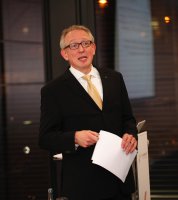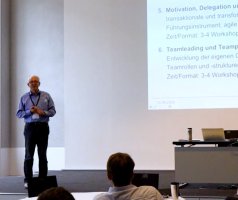Human resource development
 The world has become more complex, multi-layered and interconnected. We are all experiencing a constant acceleration and alienation of our world, which was very aptly described and analysed by the sociologist Hartmut Rosa in 2013. At the moment we cannot estimate exactly how far these globally effective processes can be increased, but we are confronted with the effects in all forms of life - of course also in working life.
The world has become more complex, multi-layered and interconnected. We are all experiencing a constant acceleration and alienation of our world, which was very aptly described and analysed by the sociologist Hartmut Rosa in 2013. At the moment we cannot estimate exactly how far these globally effective processes can be increased, but we are confronted with the effects in all forms of life - of course also in working life.
But we grew up in a world that seemed much slower and, above all, more manageable and controllable. The world of our childhood shaped us and the educational ideals of the time were not geared towards constant change, lifelong learning and challenging agility. Since we can never completely give up the demands we learned in childhood, we have to perform a balancing act in order to meet today's demands. We are required to live in two worlds. This balancing act often results in protracted psychological 'strains', the causes of which we ourselves cannot pinpoint.
 My Concept of the Unconscious assumes that many everyday conflicts are symptoms of such strains without the reasons for these inner conflicts ever being recognized. At management level and in teams of staff the reasons for such difficulties may be found in unconscious, long-established and gridlocked behavioural structures. Such high-friction structures of behaviour and organization arise not only in company departments but also in teams of staff in public institutions, teaching staff, and other groups where people work together and are reliant on each other.
My Concept of the Unconscious assumes that many everyday conflicts are symptoms of such strains without the reasons for these inner conflicts ever being recognized. At management level and in teams of staff the reasons for such difficulties may be found in unconscious, long-established and gridlocked behavioural structures. Such high-friction structures of behaviour and organization arise not only in company departments but also in teams of staff in public institutions, teaching staff, and other groups where people work together and are reliant on each other.
They can manifest themselves in various phenomena and symptoms:
- poor working atmosphere
- high employee turnover
- above-average sick leave
- burn-out symptoms
- harassment at the workplace
- loss of motivation among staff
- leadership conflicts
- decisions that turn out to be harmful for the company / institution
A psychoanalytically oriented human resources trainer does not present any ready solutions but provokes and encourages executives and teams to make changes which ultimately they have to carry out themselves. If intervention reveals unconscious structures of behaviour and organization then conflicts that constrain cooperation or disturb the well-being of individual members of staff can be understood and processed. This opens up new possibilities for decision-making and action.
 It can help us here that the concepts are based on a scientific basis and take into account the diverse studies that exist on leadership and motivational psychology.
It can help us here that the concepts are based on a scientific basis and take into account the diverse studies that exist on leadership and motivational psychology.
 The high value I give to scientific foundations is also reflected in the fact that on the one hand I am a member of the DBVC Deutscher Bundesverband Coaching e.V. as a certified scientific expert in the field of coaching and secondly as a Scientific Coaching Expert in the IOBC International Organization for Business Coaching e.V., the only international umbrella organization for professional coaching with an exclusive focus on business coaching and leadership.
The high value I give to scientific foundations is also reflected in the fact that on the one hand I am a member of the DBVC Deutscher Bundesverband Coaching e.V. as a certified scientific expert in the field of coaching and secondly as a Scientific Coaching Expert in the IOBC International Organization for Business Coaching e.V., the only international umbrella organization for professional coaching with an exclusive focus on business coaching and leadership.
As a human resources trainer I offer:
- Psychoanalytically oriented Coaching for executives
- Group processes: development and encouragement of teamwork
- Supervision
Just click on the topics that interest you on the left. If you have further questions, please call me or write me an email. You can find all contact options here: Contact
Profiles on other platforms
If you want to access my profile in Wikipedia, click here:
.
If you want to access my profile in Xing, click here:
If you want to access my profile in LinkedIn, click here:
go to top



